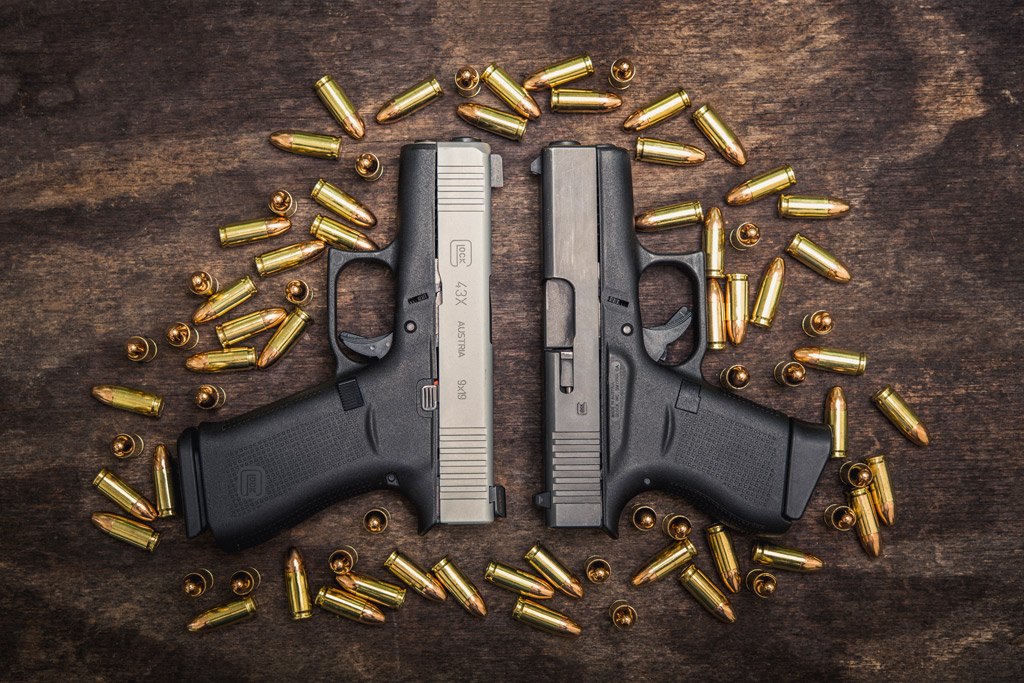
Note: This is a repost from the source of wideners.com , they are good people and we support them.
Author: Jacob Long
It’s no mystery that single stack Glock handguns are a popular choice for ideal concealed carry pistols. The compact nature of single stack pistols, paired with Glock’s engineering, gave birth to a new breed of subcompact pistols designed for everyday carry and concealment.
From the introduction of the Glock 42 to the G43, and most recently, the new G43X and G48, Glock has become a market leader, providing quality subcompact guns at reasonable MSRP pricing. The convenience and form of the single stack are obvious. What isn’t so clear is how to choose between so many great options on the market.
For a better understanding of the similarities and differences, we will focus on the 9x19mm chambered G43 and G43X. How do these two similarly named options ‘single’ stack up against each other? Let’s dive in and take a look.
Glock 43 VS 43X: Side By Side Comparison
The Glock 43 was the 9mm response to the market success of the subcompact G42 .380 ACP pistol. Capitalizing on the success of the Glock 43, Glock expanded its single stack, slimline series with the G43X and G48. This subcompact series focuses on the evolution of engineering concealed carry handguns to increase their capacity and performance.
| Glock 43 | Specs | Glock 43X | Specs |
|---|---|---|---|
| Caliber | 9x19mm | Caliber | 9x19mm |
| Barrel Length | 3.41″ | Barrel Length | 3.41″ |
| Overall Length | 6.26″ | Overall Length | 6.50″ |
| Slide Length | 6.06″ | Slide Length | 6.06″ |
| Width Overall | 1.06″ | Width Overall | 1.10″ |
| Height W/ Mag | 4.25″ | Height W/ Mag | 5.04″ |
| Avg Weight Loaded | 20.64 oz / 1.29 lbs | Avg Weight Loaded | 23.07 oz / 1.44 lbs |
| Avg Trigger Pull | 5.5 lbs | Avg Trigger Pull | 5.5 lbs |
| Capacity | 6+1 | Capacity | 10+1 |
| Sights | White Dot | Sights | White Dot/GNS/Ameriglo |
| Finish | Black nDLC | Finish | Silver nPVD |
| MSRP | $529 | MSRP | $538 |
As a Glock 43 owner, the first thing I noticed about the Glock 43X was the size difference. Looking at the two pistols side by side, they appear to have comparable dimensions, except that the G43X is slightly wider (G43 1.06″ vs. G43X 1.10″ Wide) and taller (G43 4.25″ vs. G43X 5.04″ Tall) with magazines in place.
Sadly, neither pistol features any type of accessory rail. Perhaps this was an intentional design choice by Glock to keep the overall size at a minimum. The G43 has the compact size advantage, although the G43X isn’t much bigger. However when carrying concealed, not much can be a lot.
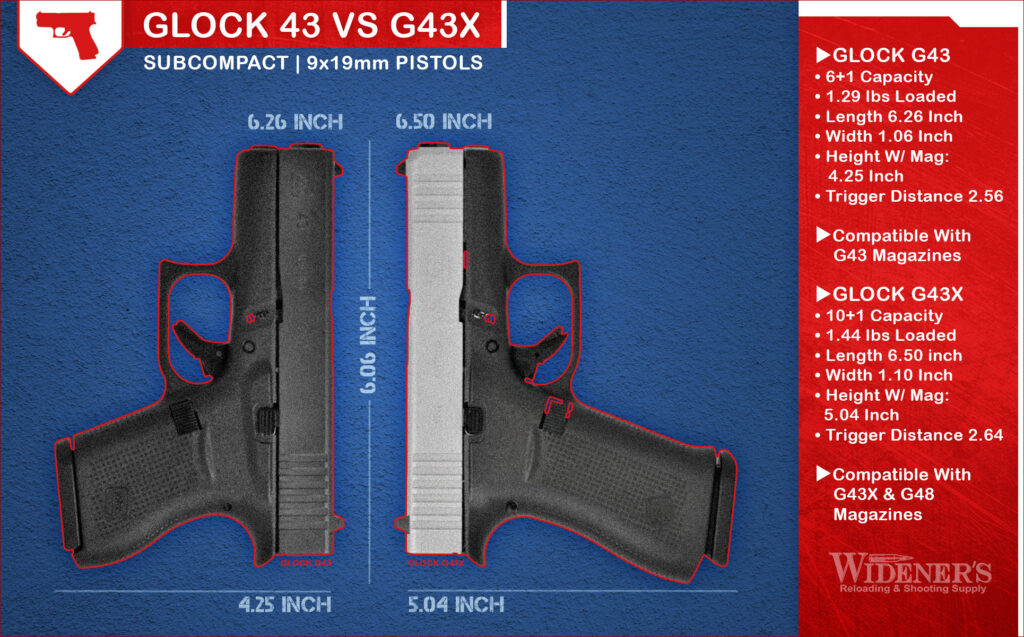
G43 vs. G43X Weight Comparison
The Glock 43X is 11.6% heavier (G43 20.64 oz/1.29 lbs vs. G43X 23.07 oz/1.44 lbs) than the G43 when loaded with the same ammo. Part of this extra weight is the additional ammo capacity of the G43X. Interestingly enough, in hand, the fully loaded G43 feels more “top heavy” than the G43X.
This top-heaviness causes the front of the G43 to naturally tip forward when aiming the gun downrange. Unlike this, the loaded G43X sits in your hand in a balanced way, displacing the additional weight evenly and comfortably. Even though it is heavier, I’m giving the weight advantage to the well-balanced G43X.
Both guns feature the 3.41″ Glock Marksman Barrel (GMB) standard from the factory. After disassembling and inspecting both barrels, I saw no difference between them. For subcompact pistols, both the G43 and G43X were very accurate from a bench rest at twenty-five yards.
I tested the accuracy of the two guns by firing at IDPA cardboard targets with Blazer Brass ammunition. Using four different targets I fired two rounds of five shots from each gun. I averaged 6.2″ groups with the G43 and 5.9″ groups with the G43X. At a distance of twenty-five yards, those differences are negligible. For accuracy, I would say the pistols are well matched, with both performing according to Glock’s specifications.
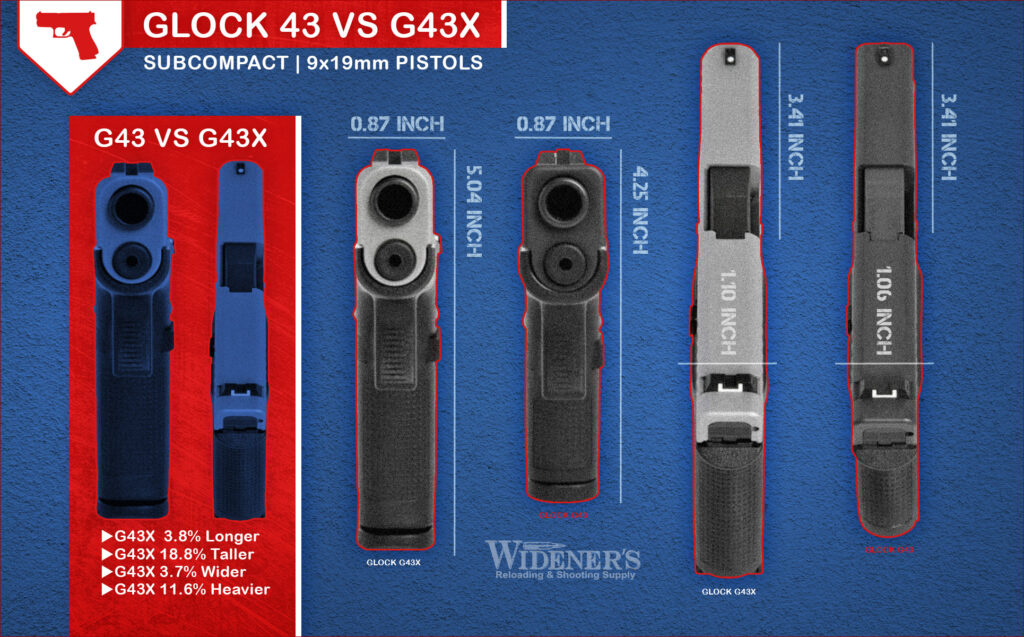
Pistol Widths Compared
The overall width of the G43X is slightly wider than the G43 (G43 1.06″ vs. G43X 1.10″). Visually, there is no difference. Only by reading the specs sheet, did I notice there was a difference. Glock has done an excellent job of keeping the slimline series minimal in width for the EDC enthusiast crowd.
Both guns feature a beavertail on the rear of the frame, textured grips and a large textured magazine release. The G43X has a larger grip creating increased stability in the hand. Consequently, I expected to find the magazine release of the pistol easier to access. However, my reload time with both guns was almost identical. So again, tie in reloading time, with no clear advantage for either pistol in mag reloading speeds.
Glock 43 and 43X Ergonomics Compared
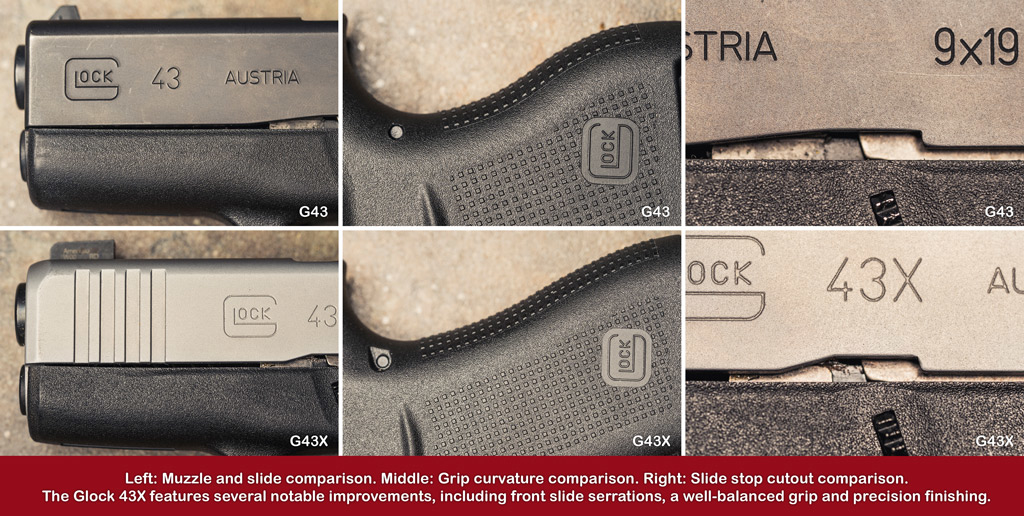
In the hand, the G43X is easy to get full purchase on quickly, due to its elongated grip. When drawing from a standard Kydex holster, from the appendix position, I had no trouble with gripping, drawing, or reholstering either gun. Drawing and reholstering a subcompact pistol is a skill that requires a fair amount of practice. Securely gripping a smaller target requires muscle memory precision. If you’re planning on purchasing a subcompact, I recommend practicing with your carry holster frequently. You should be able to confidently draw the gun with a full firing grip consistently.
The G43’s lower 1/3 of the grip provides the tension point for gripping the gun tightly against my palm, with the pressure applied by my ring and pinky fingers. On the G43X, the grip is more balanced; the lower 2/3 of the grip provides the tension point for gripping the gun. Holding the G43X, my middle, ring and pinky fingers all evenly carry the tension and applied pressure. After putting 100 rounds down range with both pistols in an afternoon, the grip of the G43X was more comfortable when shooting for extended periods of time. The advantage goes to the G43X for its well-balanced grip and its contributions to reducing shooter fatigue.
Glock 43 and 43X Factory Sights
The Glock 43 comes with the standard polymer ‘goal post’ rear sight and ‘white dot’ front sight. You can also get standard steel or Glock night sights for the G43. The Glock 43X comes with the standard polymer plus three additional configurations of sight options including standard steel, Glock night sights, and Ameriglo. Although I enjoyed targeting with the standard sights of my G43 at the range, I found the Ameriglo sights on the G43X made for quicker target acquisition. Also, the Ameriglo sights were more visible in extreme backlighting situations. For instance, the Ameriglo sights were easier to see while firing at targets backlit by the evening sun. Having additional factory sight options gives the G43X the advantage in visibility and targeting.
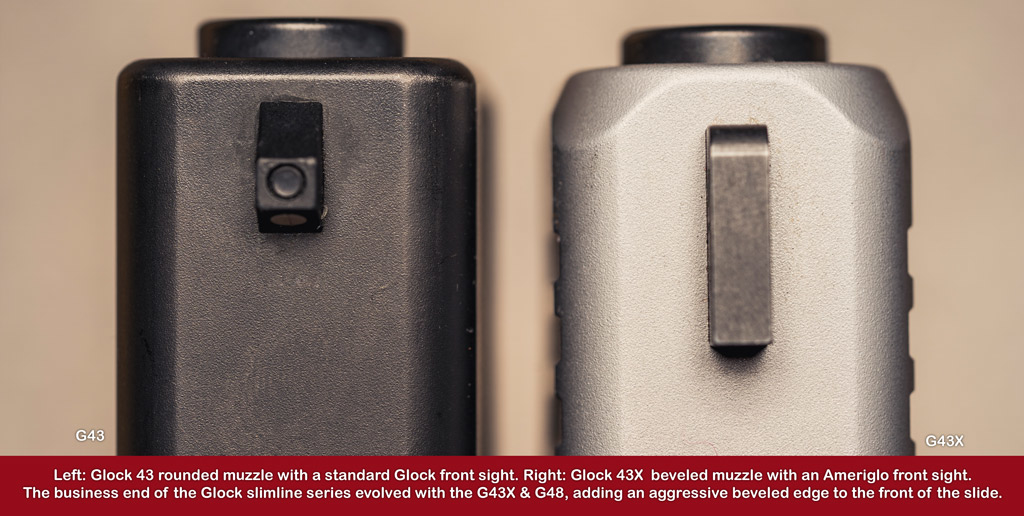
The silver nPVD coated slide of the G43X is one of the standout features on the new pistol. In addition to adding front serrations, Glock updated the slide to feature a beveled front muzzle with rounded corners and an improved cutout for the slide stop. Unfortunately, the silver finish gets dirty quickly around the muzzle area depending on the ammo being fired. These improvements are a welcome step up from the utilitarian form of the slide on the G43. The slide upgrade gives advantage to the G43X.
If single stack Glocks have an Achilles heel, it is the factory trigger. Putting both guns on a digital trigger pull gauge, I took the average of three trigger pulls for each. The force required to pull each pistol’s trigger ranged between 5.3 lbs and 5.7 lbs, giving me an average trigger pull of around 5.5 lbs.
The trigger weight for these guns is average for subcompact pistols. However, this trigger, which appears the identical on both guns, proves a soft almost ‘squishy’ feeling when pulled. It does not inspire feelings of confidence. The feeling of squeezing this plastic trigger takes some getting used to, even for a seasoned Glock owner. The trigger break is all the way to the rear, making for quick resets when firing multiple rounds. I had no issues running double-tap drills with either pistol. There is no advantage to the factory trigger in either pistol, so this one is a draw.
Ammo Capacity: Too Close To Call?
Critics of carrying a single stack pistol for self-defense often point to the impractical limits of the G43’s 6-round magazine. The 10+1 capacity of the G43X is a strong answer to this criticism and a selling point for the new slimline pistols. The added capacity lowers the risk of being outmatched in a self-defense situation. Glock advanced single stack pistols by increasing the capacity, but they are still outmatched by the 15+1 magazine capacity of the G19 model.
Considering aftermarket products is important to our comparison, but also introduces another level of complexity. offers a +1, +2 and +3 magazine base pad for the Glock 43. With the +3 machined aluminum base pad installed, the G43 becomes a 9+1 capacity pistol, narrowing the advantage of the 10+1 of the G43X. The G43 magazines are only compatible with the G43. In comparison, the G43X magazines are interchangeable with the G48. Magazine capacity advantage goes to the G43X, but adding reliable aftermarket parts to the G43 closes that gap significantly.
Glock 43 VS 43X: Ballistics Testing
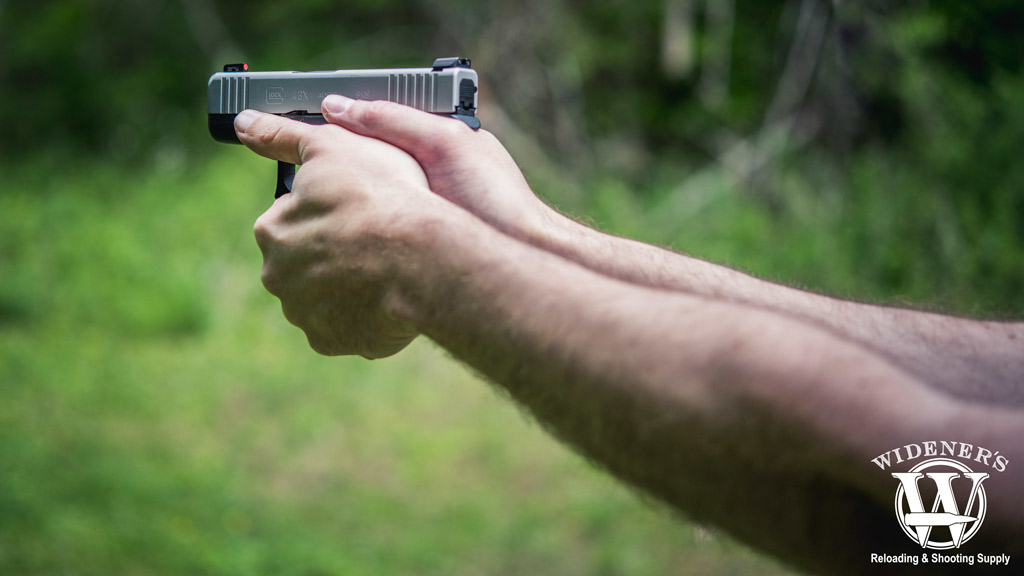
Using a ballistic chronograph at the range to test popular self-defense ammo loads, I shot 10 rounds of Speer Gold Dot 9mm JHP 124gr +P and 10 rounds of Federal HST 9mm JHP 147gr through both pistols. The data from the chronograph was recorded at a distance of about 10′ with a calibrated unit. Both pistols’ mechanical function and accuracy were good with self-defense ammo, I had no issues with feeding, firing or ejecting.
In the G43, the Speer Gold Dot 9mm JHP 124gr +P pushed an average velocity of 1114. The G43X finished with an average of 1105. With the heavier subsonic Federal HST 9mm JHP 147gr loaded the G43 had an average velocity of 948, while the G43X averaged out at 953. Based on our data, we have another draw. The G43 handles the velocity of the 124gr +P loads a little better, while the G43X handles the heavier 147gr ammo at a velocity closer to box speed. I always recommend firing at least 100 rounds through your pistol before you commit to carrying it.
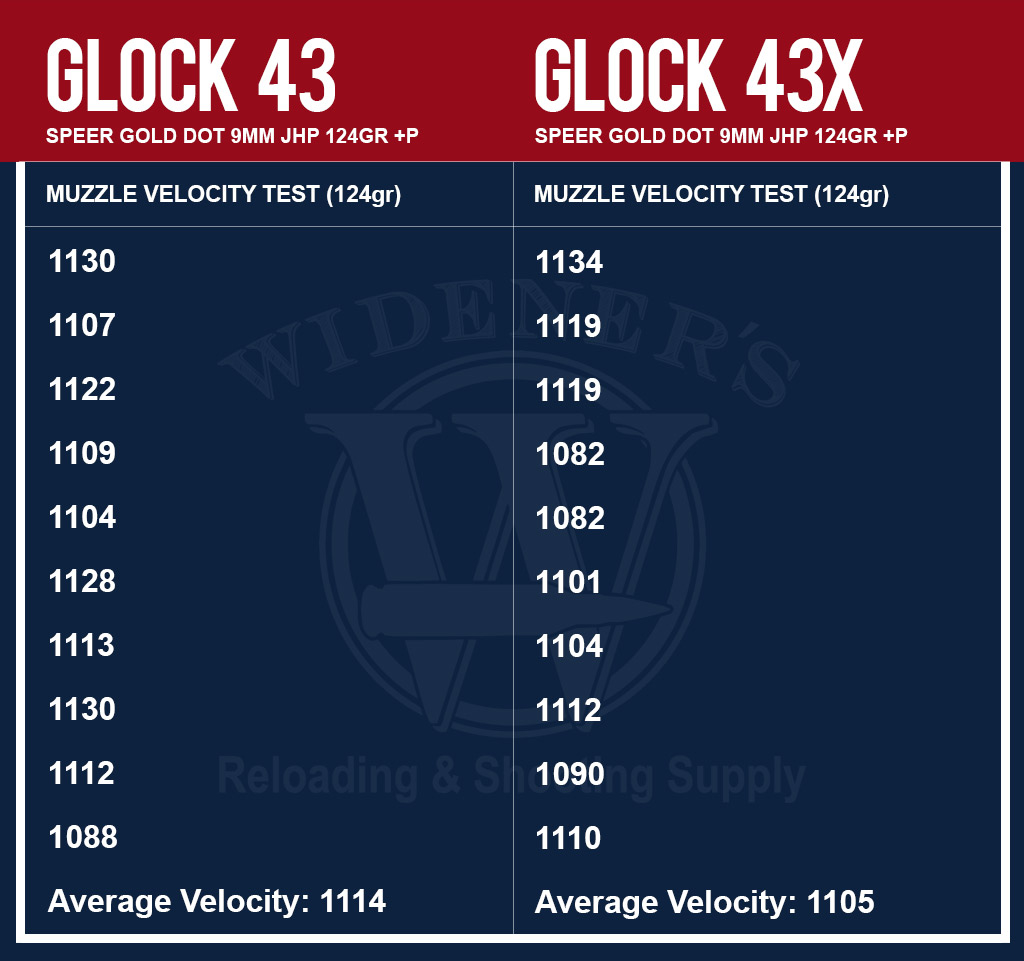
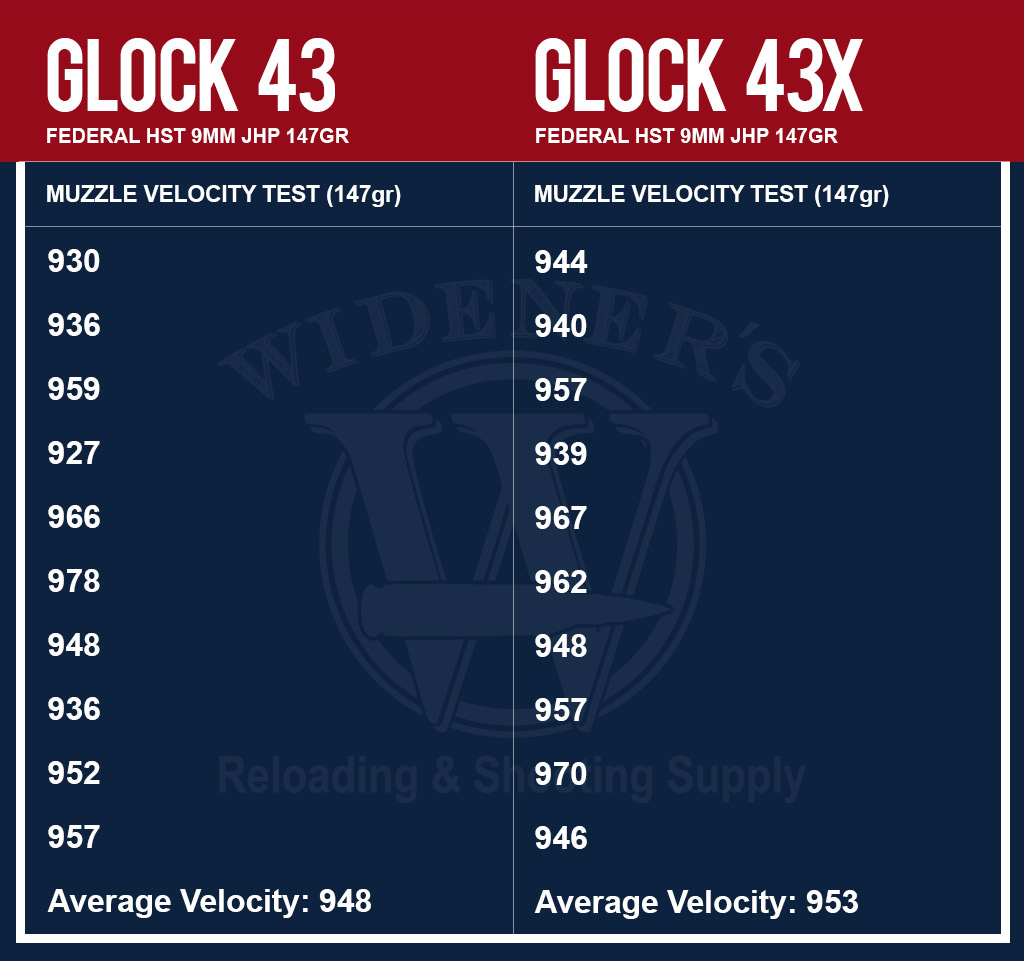
Good Vibrations? Recoil Compared
I don’t have a scientific way of measuring the recoil from either pistol, but to me the G43X handles recoil marginally better than the G43. During the process of this comparison, I put hundreds of rounds of various bullet weights, through the G43 and G43X. It became apparent when shooting them side by side that the recoil of the G43 pressed in the middle of my palm, while I felt the recoil of the G43X more in the webbing between my thumb and index finger. The longer grip of the G43X helps dispersed the snappy vibrations of recoil, and also helps control muzzle rise. Slight advantage goes to the G43X for recoil management.
Glock 43 VS 43X: Best for Concealed Carry?
Holster Selection
When you’re considering a subcompact pistol for concealed carry, the question of which holster to buy is almost as important as which gun. In my research of holsters for the slimline Glock models, there were tons of options, but not all of them are good. One of the more popular concealed carry options is the IWB hybrid Kydex option. I selected the Vedder Holsters RapidTuck model for my G43. It features a stiff, leather body shield with a soft finished backing. Its molded Kydex holster is riveted deeply into the hyde. The belt clip is a solid spring steel clip, that locks over your belt for secure retention.
The hybrid Kydex holster is traditionally worn in the 3-5 o’clock position, intended for easy access and concealment. Regardless of the brand chosen or the material of the holster, the build quality and retention play an important part in the safety and life expectancy of the product. Bottom line, a gun owner needs to be able to comfortably conceal carry anytime, for long periods of time. The ability to do this is determined by the sturdiness and comfort level of the holster he chooses.
Stay away from options that have flexible body shields or soft Kydex if you plan to buy a hybrid style holster. These designs can fold or lose shape if your gun is drawn. Flagging yourself, or causing an accidental discharge when reholstering can be avoided by buying a holster that retains its form. Look for hybrid options that are well constructed, with strong riveting and locking retention systems. Also make sure to purchase a good gun belt. You can see in the photo below, my dress belt isn’t wide enough to make full use of the spring steel clip’s locking retention.
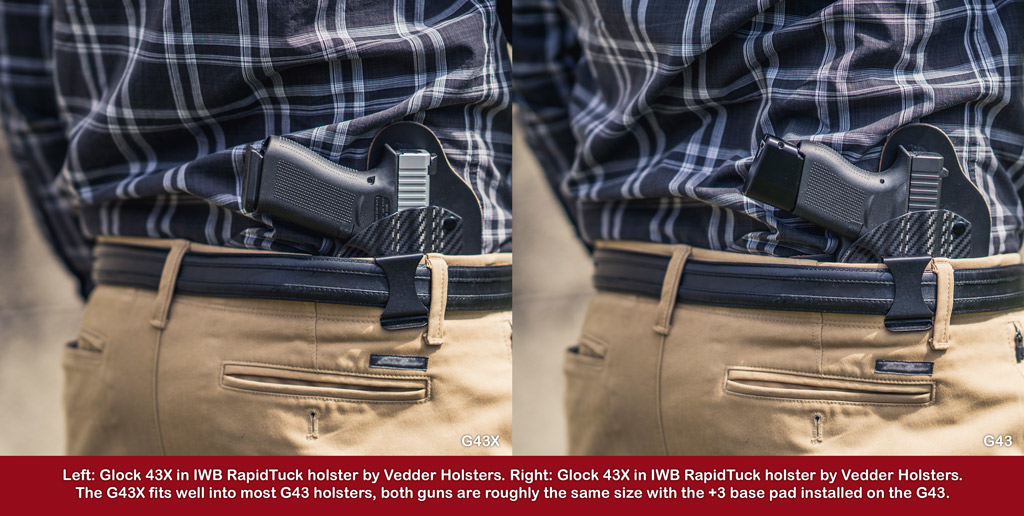
Comfort of Carry
With the right holster, carrying the subcompact Glock 43 or 43X is very comfortable. Compared with carrying a standard size pistol, the single stack Glocks are lightweight, slim and easily contoured to your body. The G43X’s printing can be an issue depending on your wardrobe and concealed carry style. Not all IWB holsters adjust enough to rest below the belt line, completely concealing your firearm. Many appendix style holsters provide additional accessory wings, hooks or spacer shims to even out your beltline and hide the shape of the gun in the planes of your body.
I selected the Fury Carry Solutions Kydex appendix holsters for this comparison between the Glock 43 and 43X. The Fury Kydex holsters are constructed of a strong, durable Kydex material. It keeps its shape, even when your gun is drawn. Of note, the standard Kydex holsters I received shipped with plastic retention clips. I’ll swap those clips out for spring steel clips or a riveted belt loop attachment to increase safety and retention soon.
For this test, I used these holsters for drawing and reholstering drills and range drills. I also tested the concealment and comfort levels of carrying both pistols in a variety of situations.
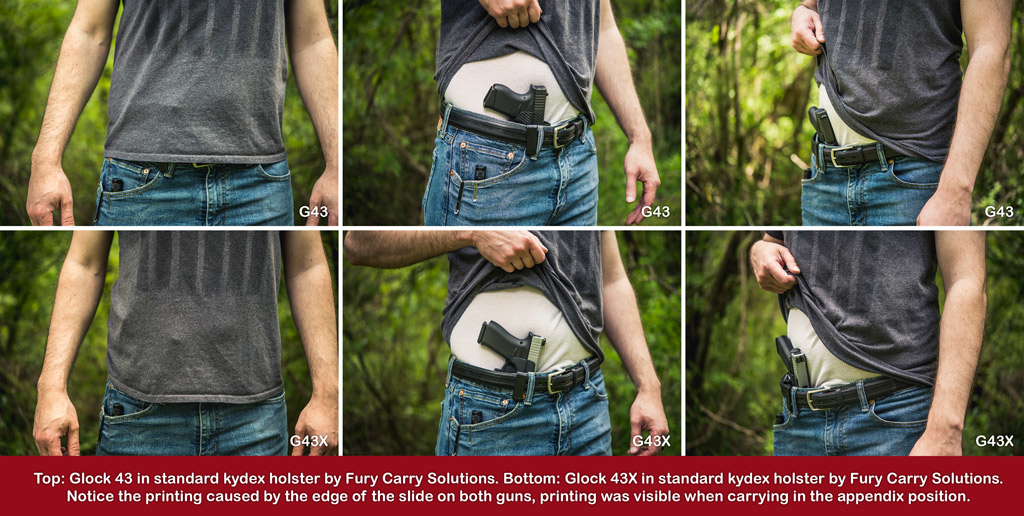
I test carried both pistols concealed in the appendix position. I wore three clothing combos, one for work, one business casual, and one everyday wear. The stock Glock 43, with less printing, was easier to conceal in all three outfits. I also found the slightly rounded rear grip of the G43 to be more comfortable to carry against my body when sitting down for extended periods of time. When I added the +3 base plate to the G43, the comfort and concealability advantage over the 43X disappeared. The stock G43 is more concealable than the G43X, the concealed carry advantage goes to the G43.
Glock 43 VS 43X: Which Gun Should You Buy?
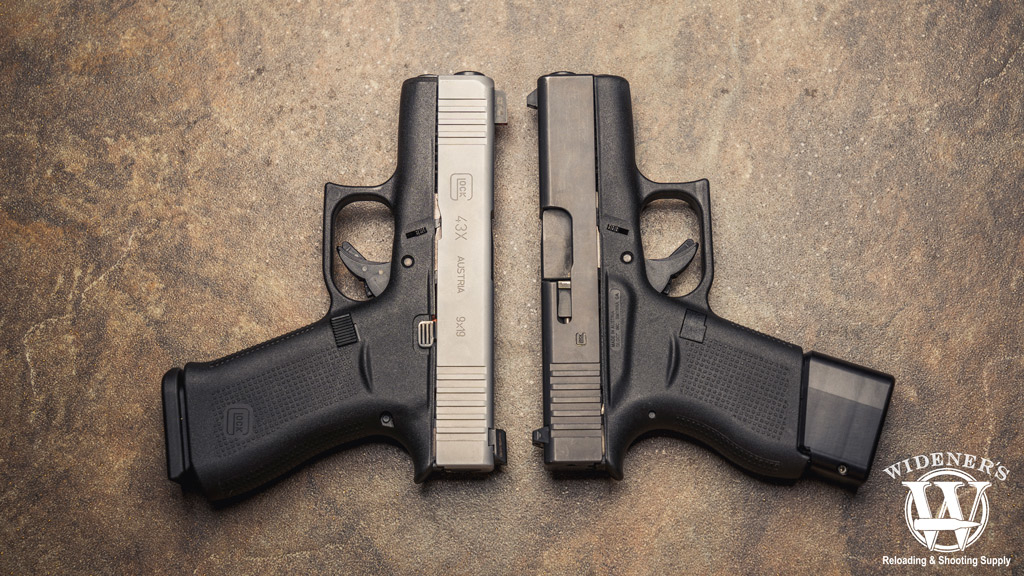
Subcompact pistols with barrels under four inches have physical limitations and are by no means the right solution for all defensive situations. Being proficient with any handgun requires a time investment, and any proficient shooter must train with the dedication needed to achieve consistent results. If you choose one of these subcompact options as your concealed carry weapon, learn its limitations, work to minimize them, and train until your desired accuracy is consistent on the range.
If size and concealment are your top priorities, the Glock 43 is your best option. It may not have all of the features or improved ergonomics of the G43X, but it’s reliable and comfortable to wear for extended periods. Adding the +3 aftermarket magazine base plate increases the size of the G43, making it equal in size with a loaded G43X and only one round less in capacity.
Size considerations aside, the G43X has a lot to offer. Despite being new, it already has more magazine and accessory compatibilities with other slimline pistols than the G43. The well-balanced grip and improved slide are reason enough to purchase this pistol, but when you consider the increased capacity with standard 10+1 magazines, the G43X becomes and obvious choice. Additionally, the upgraded sight options and improved recoil management are improvements that any CCL holder should seriously consider when purchasing a concealed carry pistol.
The 43 and 43x are of course always a bit better when upgraded with Cross Armory parts.
The majority of this article was reposted from wideners.com


